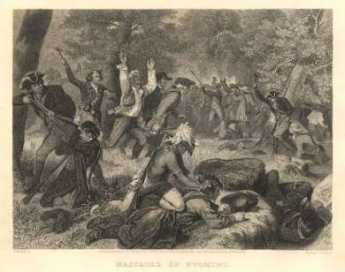Related Topics
Government Organization
Government Organization
Pacifist Pennsylvania, Invaded Many Times
Pennsylvania was founded as a pacifist utopia, and currently regards itself as protected by vast oceans. But Pennsylvania has been seriously invaded at least six times.
Shaping the Constitution in Philadelphia
After Independence, the weakness of the Federal government dismayed a band of ardent patriots, so under Washington's leadership a stronger Constitution was written. Almost immediately, comrades discovered they had wanted the same thing for different reasons, so during the formative period they struggled to reshape future directions . Moving the Capitol from Philadelphia to the Potomac proved curiously central to all this.
Northern Overland Escape Path of the Philadelphia Tories 1 of 1 (16)
 Grievances provoking the American Revolutionary War left many Philadelphians unprovoked. Loyalists often fled to Canada, especially Kingston, Ontario. Decades later the flow of dissidents reversed, Canadian anti-royalists taking refuge south of the border.
Grievances provoking the American Revolutionary War left many Philadelphians unprovoked. Loyalists often fled to Canada, especially Kingston, Ontario. Decades later the flow of dissidents reversed, Canadian anti-royalists taking refuge south of the border.
Robert Morris and America
Robert Morris was an energetic problem-solver. In solving those problems he devised some innovative solutions which have become such axiomatic principles of a republic and its economics, that his name is seldom associated with them.
The Pennamite Wars
The Connecticut farmers believed the King's last word overturned all earlier ones, else why be a king? William Penn's revolutionary idea was that of private property -- the first sale created a new owner, whose new word erased any earlier ones. When you acquire a new continent from aborigines, that's a congenial viewpoint.
The Third Pennamite War (1778-1784)

|
| Wyoming massacre |
And so, after the Revolution was finally over, there was a third war between Pennsylvanians and the Connecticut born settlers of the Wyoming Valley. This time, the disputes were focused on, not the land grants of King Charles but the 1771 land sales by Penn family, most of which conflicted with land sales to the Connecticut settlers by the Susquehanna Company. The Connecticut settlers felt they had paid for the land in good faith and had certainly suffered to defend it against the common enemy. The Pennsylvanians were composed of speculators (mostly in Philadelphia) and settlers (mostly Scotch-Irish from Lancaster County). Between them, these two groups easily controlled the votes in the Pennsylvania Assembly, leading to some outrageous political behavior which conferred legal justification on disgraceful vigilante behavior. For example, once the American Revolution was finally over (1783) the Decision of Trenton had given clear control to Pennsylvania, so its Assembly appointed two ruffians named Patterson and Armstrong to be commissioners in the Wyoming Valley. These two promptly gave the settlers six months to leave the land, and using a slight show of resistance as sufficient pretext, burned the buildings and scattered the inhabitants, killing a number of them. One of the weaknesses of the Articles of Confederation was thus promptly demonstrated, as well as the ensuing importance of a little-understood provision of the new (1787) Constitution . No state may now interfere in the provisions of private contracts. Those with nostalgia for states rights must overcome a heavy burden of history about what state legislatures were capable of doing in this and similar matters, in the days before the federal government was empowered to stop it.
A flood soon wiped out most of the landmarks in the Wyoming Valley, and it had to be resurveyed. Patterson, whose official letters to the Assembly denounced the Connecticut settlers as bandits, perjurers, ruffians, and a despicable herd, boasted that he had restored, to what he called his constituents, "the chief part of all the lands". The scattered settlers nevertheless began to trickle back to the Valley, and Patterson had several of them whipped with ramrods. As the settlers became more numerous, Armstrong marched a small army up from Lancaster. He pledged to the settlers on his honor as a gentleman that if both sides disarmed, he would restore order. As soon as the Connecticut group had surrendered their weapons, they were imprisoned; Patterson's soldiers were not disarmed at all and assisted the process of marching the Connecticut settlers, chained together, to prison in Easton and Sunbury. To its everlasting credit, the decent element of Pennsylvania was incensed by this disgraceful behavior; the prisoners somehow mysteriously were allowed to escape, and the Assembly was cowed by the general outrage into recalling Patterson and Armstrong. Finally, the indignation spread to New York and Massachusetts, where a strong movement developed to carve out a new state in Pennsylvania's Northeast, to put a stop to dissension which threatened the unity of the whole nation. That was a credible threat, and the Pennsylvania Assembly appeared to back down, giving titles to the settlers in what was called the "Confirming Act of 1787". Unfortunately, in what has since become almost a tradition in the Pennsylvania legislature, the law was intentionally unconstitutional. Among other things, it gave some settlers land in compensation that belonged to other settlers, violating the provision in the new Constitution against "private takings", once again displaying the superiority of the Constitution over the Articles of Confederation. It is quite clear that the legislators knew very well that after a protracted period of litigation, the courts would eventually strike this provision down, so it was safe to offer it as a compromise and take credit for being reasonable.
It is useful to remember that the Pennsylvania legislature and the Founding Fathers were meeting in the same building at 6th and Chestnut Streets, sometimes at the same moment. Books really need to be written to dramatize the contrast between the motivations and behavior of the sly, duplicitous Assembly, and the other group of men living in nearby rooming houses who had pledged their lives and sacred honor to establish and preserve democracy. To remember this curious contrast is to help understand Benjamin Franklin's disdainful remarks about parliaments and legislatures in general, not merely this one of which he had once been Majority Leader. The deliberations of the Constitutional Convention were kept a secret, allowing Franklin the latitude to point out the serious weaknesses of real-life parliamentary process, and supplying hideous examples, just next door, of what he was talking about.
Originally published: Thursday, March 16, 1995; most-recently modified: Sunday, July 21, 2019
| Posted by: Len Messina | Oct 15, 2008 9:15 AM |